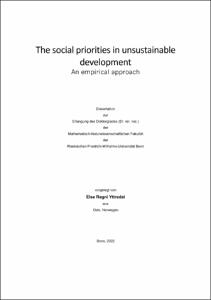Yttredal, Else Ragni: The social priorities in unsustainable development : An empirical approach. - Bonn, 2023. - Dissertation, Rheinische Friedrich-Wilhelms-Universität Bonn.
Online-Ausgabe in bonndoc: https://nbn-resolving.org/urn:nbn:de:hbz:5-69626
Online-Ausgabe in bonndoc: https://nbn-resolving.org/urn:nbn:de:hbz:5-69626
@phdthesis{handle:20.500.11811/10610,
urn: https://nbn-resolving.org/urn:nbn:de:hbz:5-69626,
author = {{Else Ragni Yttredal}},
title = {The social priorities in unsustainable development : An empirical approach},
school = {Rheinische Friedrich-Wilhelms-Universität Bonn},
year = 2023,
month = jan,
note = {From the late 1980s onwards, a generally accepted conception of sustainable development as a balance between the social system, economic system and biophysical environment has emerged and serves as an underpinning for global knowledge building and human striving into the future. However, the global academic community has thoroughly and meticulously shown that current global development is not progressing towards sustainability understood as such a balance. Why is this? During a period of five years, three studies on the challenges of sustainable development in the Geiranger area, Norway, have shed light on this question.
Covering the themes of crowding, visitor expenditure and perceptions of sustainable development, these studies have diverged theme-wise, methodologically and in relation to informant groups. Still, using a three-pillar sustainable development lens, the findings from the studies turned out to have some striking similarities regarding the predominance of the social aspects for understanding the challenges to sustainable development. Therefore, using abductive reasoning, a hypothesis-testing study was conducted in the same geographical area.
The results stand in stark contrast to the dominant systems-oriented three-pillar conception of sustainable development, namely; As an individual, social issues are generally prioritised over economic and environmental issues related to sustainable development. As geographical distance increases, individuals are more inclined to prioritise environmental issues. Still, when accounting for all geographical levels, if economic or environmental issues are prioritised, the reason for this is that these issues lead to higher level of social gains.
Hence, the current thesis proposes that the basis of unsustainable development may lie in humans’ predominantly social priorities and preferences related to sustainable development. These discoveries may have far-reaching consequences for the understanding of the concept of sustainable development and the driving forces behind the perceptions, values and behaviour related to such a development, as well as how to proceed politically towards the aim of sustainability.
In this cumulative doctoral thesis, the hypothesis-testing study is presented first, forming a frame highlighting the most surprising findings and implications of the three preceding studies. However, the three studies on the challenges of sustainable development also have interesting findings in their own right regarding the themes of perceptions of sustainable development, perceived crowding and visitor expenditure.},
url = {https://hdl.handle.net/20.500.11811/10610}
}
urn: https://nbn-resolving.org/urn:nbn:de:hbz:5-69626,
author = {{Else Ragni Yttredal}},
title = {The social priorities in unsustainable development : An empirical approach},
school = {Rheinische Friedrich-Wilhelms-Universität Bonn},
year = 2023,
month = jan,
note = {From the late 1980s onwards, a generally accepted conception of sustainable development as a balance between the social system, economic system and biophysical environment has emerged and serves as an underpinning for global knowledge building and human striving into the future. However, the global academic community has thoroughly and meticulously shown that current global development is not progressing towards sustainability understood as such a balance. Why is this? During a period of five years, three studies on the challenges of sustainable development in the Geiranger area, Norway, have shed light on this question.
Covering the themes of crowding, visitor expenditure and perceptions of sustainable development, these studies have diverged theme-wise, methodologically and in relation to informant groups. Still, using a three-pillar sustainable development lens, the findings from the studies turned out to have some striking similarities regarding the predominance of the social aspects for understanding the challenges to sustainable development. Therefore, using abductive reasoning, a hypothesis-testing study was conducted in the same geographical area.
The results stand in stark contrast to the dominant systems-oriented three-pillar conception of sustainable development, namely; As an individual, social issues are generally prioritised over economic and environmental issues related to sustainable development. As geographical distance increases, individuals are more inclined to prioritise environmental issues. Still, when accounting for all geographical levels, if economic or environmental issues are prioritised, the reason for this is that these issues lead to higher level of social gains.
Hence, the current thesis proposes that the basis of unsustainable development may lie in humans’ predominantly social priorities and preferences related to sustainable development. These discoveries may have far-reaching consequences for the understanding of the concept of sustainable development and the driving forces behind the perceptions, values and behaviour related to such a development, as well as how to proceed politically towards the aim of sustainability.
In this cumulative doctoral thesis, the hypothesis-testing study is presented first, forming a frame highlighting the most surprising findings and implications of the three preceding studies. However, the three studies on the challenges of sustainable development also have interesting findings in their own right regarding the themes of perceptions of sustainable development, perceived crowding and visitor expenditure.},
url = {https://hdl.handle.net/20.500.11811/10610}
}






